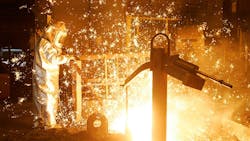U.S. steelworkers are ready to get their payout from the trade war.
Labor contracts with U.S. Steel Corp. and ArcelorMittal expired Sept. 1, but workers remain on the job as negotiations over wage increases continue. On Tuesday, U.S. Steel (IW500/92) posted on its website a proposed six-year contract, offering workers guaranteed annual wage increases and a $15,000 pre-tax cash payment, including a minimum profit-sharing of $6,000 for the balance of the year, regardless of the company performance.
“The company’s proposal is far from fair, and it’s public characterization of that proposal is far from factual,” United Steelworkers, known as USW, said in a statement emailed after U.S. Steel publicly announced its offer. “They’re trying to buy a long-term, very cheap deal with some up-front money to distract workers from the long-term costs.”
Workers are insisting on their share of the windfall from the 36% increase in the benchmark hot-rolled coil price this year after President Donald Trump imposed a 25% tariff on steel imports. While companies have reported that demand will remain strong through the rest of 2018, U.S. Steel’s share price has declined 17% this year amid analyst downgrades and concerns about long-term pricing.
Workers have gone without a wage increase in the past three years, USW said in a statement. Negotiations with U.S. Steel cover more than 16,000 workers in 24 local unions, while those with ArcelorMittal involve about 15,000 workers from 13 localities.
Since the current labor contract includes profit-sharing, it’s unlikely that a strike will occur, KeyBanc Capital Markets research analyst Phil Gibbs said in a telephone interview before U.S. Steel announced its offer to its workers.
“USW members at USS locations this week will be conducting informational meetings prior to taking strike authorization votes,” Wayne Ranick, a union spokesman, said in an email Tuesday, prior to the announcement from Pittsburgh-based U.S. Steel.
“The USW committee will meet with our ArcelorMittal membership at all locations to discuss the next steps,” he said. “If the committee determines that strike authorization is needed to achieve a fair contract, the members will vote after they have been given a chance to ask questions and review information with their elected local and international leaders.”
ArcelorMittal spokesman Bill Steers said the company doesn’t comment on contract negotiations with the workers. The Luxembourg-based company has six steelmaking locations in the U.S., according to its website.
Keybanc estimates that the average U.S. Steel union worker is making about $6,000 more this year than last year because of profit-sharing, helping them gain from the price boom. Gibbs said workers could earn between 10% to 15% more by the end of 2018.
U.S. Steel may take a hit, should it agree to “stronger base pay increases,” after salaries remained unchanged over the last three years, Gibbs said.
“There were some profit-sharing metrics that got kicked in based on hot-rolled coil prices, which the union guys are seeing now,” Gibbs said in a telephone interview. “Any time you’re shipping now, you’re profitable, so you can’t afford to take any down time.”
By Joe Deaux
About the Author
Bloomberg
Licensed content from Bloomberg, copyright 2016.
